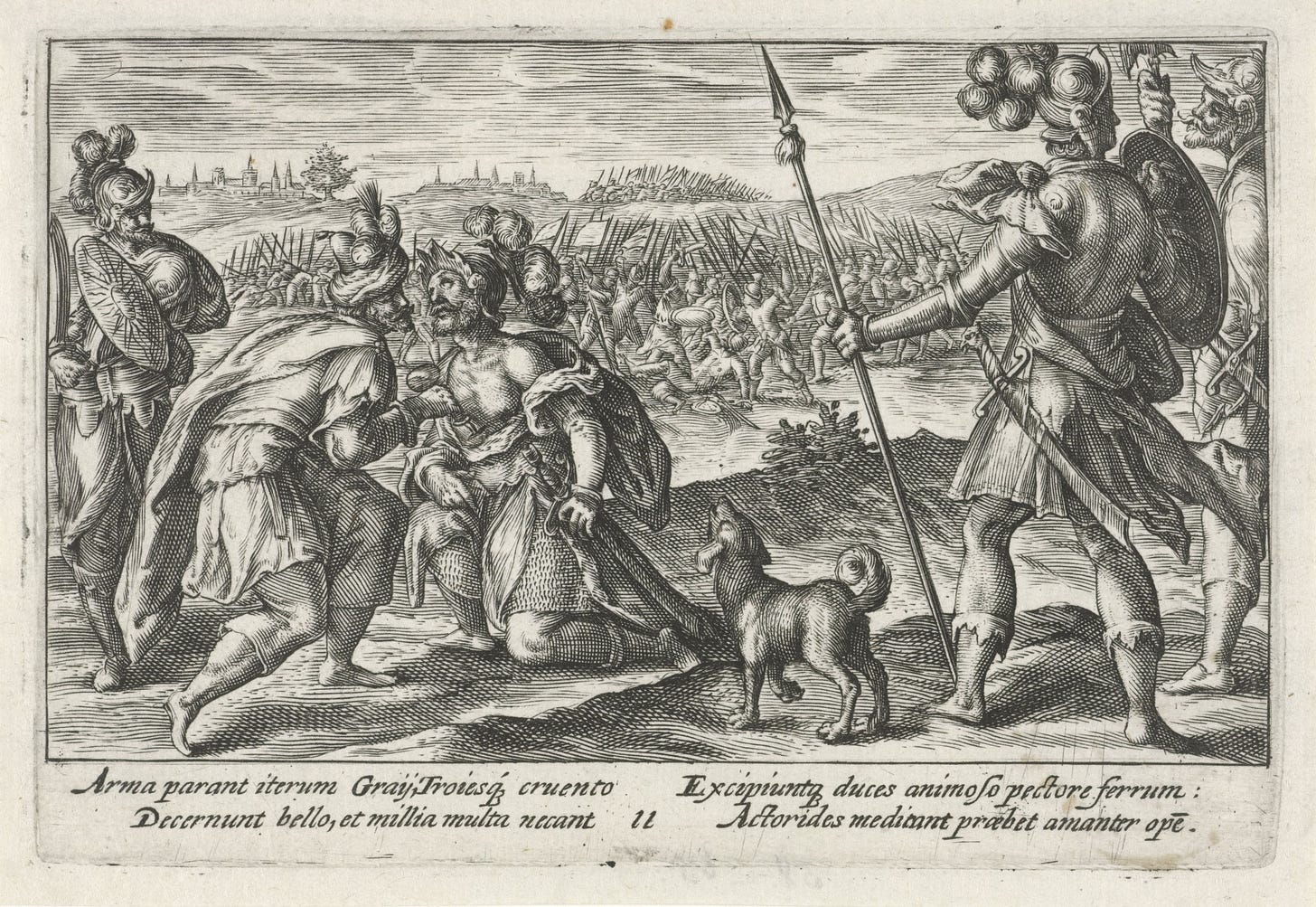Zeus has declared that this day will belong to the Trojans. He has sent the goddess Iris to tell Hector to hold back until Agamemnon is down, and that he will then prevail until sunset. And so the Trojans do prevail. Many Greeks die, the greatest heroes of the Greeks are wounded: Ulysses, Agamemnon, Diomedes.
Achilles sees a wounded man being brought in by Nestor and sends Patroclus to go see who it is, and let him know. He expects another plea for him to join the battle.
Patroclus goes to Nestor's tent, looks in and sees that the wounded man is Machaon, medic and marshal of the troops, as Achilles had guessed. When Nestor tries to bring him to the table to refresh himself, Patroclus begs off. He's got to get back to Achilles — "you know how short-tempered he is [my paraphrase]" — with the news of who the injured man is.
At this, Nestor asks why Achilles should care and tells Patroclus about the wounded heroes. Nestor wishes he himself still had the fighting power he used to. He recalls some of his greatest battle victories, when he used his valor for his people, and contrasts that to Achilles, who saves his valor for himself.
"Oh, but he'll care when the ships are burning and his own are dying!" [my paraphrase]
Now Nestor reminds Patroclus of when he came to Phthia to recruit him and Achilles for Agamemnon and the Trojan War. "Remember what your father told you. Achilles is greater than you, favored by the gods, but you're older and calmer. Take the part of his advisor. So remember this and advise him now. Maybe he will listen to a good friend1 [my paraphrase]
And then follows the fateful suggestion: If Achilles still won't help, and here Nestor gives him the benefit of the doubt "constrained by an oracle or the gods" [my paraphrase], maybe he could at least wear Achilles' armor, to encourage the Greeks and strike fear in the Trojans.
On his way back to talk to Achilles, Patroclus comes across Eurypylos, wounded and bleeding, who more than confirms the dire straits of the Greeks. After making sure Eurypylos is taken care of, Patroclus continues to Achilles.
The die is cast. There are many books yet in the Iliad of this fateful day, but before the day is out, the Trojans will seal their fate. But not before Patroclus pays a high price.

Note: the image above doesn’t seem to relate to the specific scene from the end of Book XI.
Here is my attempt to transcribe and translate the Latin in the two line on left. I couldn’t figure out the two lines on the right:
Arma parant iterum Graÿ, Troiesque cruento, Decernunt bello, et millia multa necant Once more the Greeks and the Trojans Decide for bloody war, and slay many thousands.
The word translated as friend here is "hetairos", which means boon companion, messmate, close friend, and rarely, lover. The parallel to Latin contubernales is striking. The Latin translation is "amicus", no sexual connotation. Latin translation: "Homeri Carmina et Cycli Epici Reliquiae—Graece et Latine cum Indice Nominum et Rerum" (Parisiis, Editore Ambros. Firmin Didot, 1838) for the extract from the Præfatio and the Latin text of the Ilias. Downloaded from the internet archive: https://archive.org/details/THEPROJECTGUTENBERGHOMERIILIASLATINECAROLORAETICO




Great retelling of a great and tragic part of the tale.